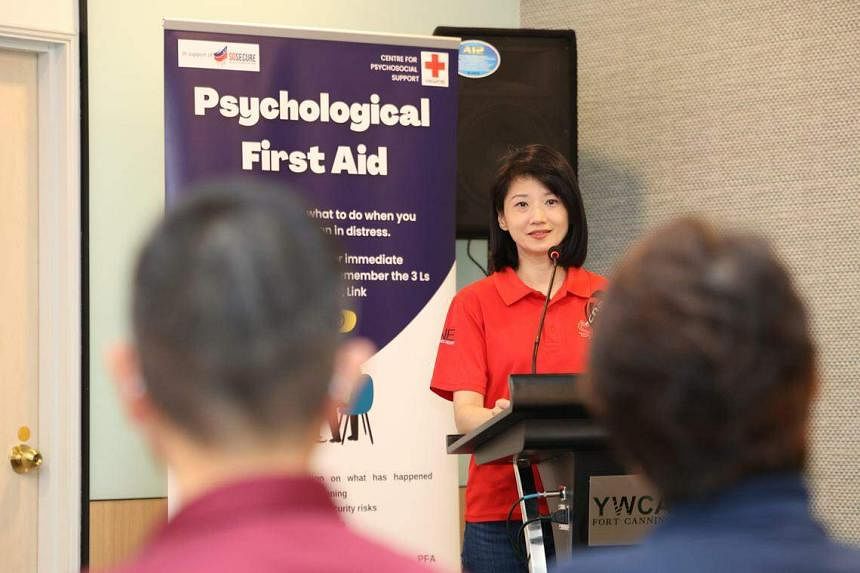SINGAPORE
New psychological first aid training programme launched for SGSecure Responders
Minister of State for Home Affairs Sun Xueling said at the launch that the use of psychological first aid had helped to connect survivors with necessary resources.
PHOTO: LIANHE ZAOBAO
Samuel Devaraj
SINGAPORE – The Singapore Red Cross (SRC) launched its inaugural psychological first aid training programme for SGSecure Responders on Saturday.
It equips participants with skills and strategies to handle emotions, thoughts and reactions triggered by stressful situations, such as a terror attack, and SRC hopes to train 1,500 responders over three years.
During the first training session on Saturday, about 20 participants from religious organisations learnt the theory of psychological first aid training before undergoing various role-play scenarios.
For instance, they were given a scenario of a traffic accident and how they could help victims.
For subsequent sessions, other groups including private security officers and public transport workers will undergo the training for which Temasek Foundation has provided a grant of about $200,000.
While SRC has been providing public psychological first aid training since 2016, the training for SGSecure Responders is tailored with relevant SGSecure content and specific scenarios.
There are currently more than 135,000 SGSecure Responders.
Speaking at the programme’s launch, SRC council member Steve Lee said psychological first aid is an important component of community resilience.
He said there was a twofold increase in enrolment for psychological first aid courses during the Covid-19 pandemic, which had exacerbated mental stress in the community, including among the isolated elderly, lower-income households and youth.
Minister of State for Home Affairs Sun Xueling, who was at the launch, noted that psychological first aid is widely considered by specialists to be a comprehensive and realistic, but non-intrusive strategy in dealing with major trauma.
She said in the aftermath of the Boston Marathon bombing in 2013, one recommendation was the establishment of walk-in disaster mental health clinics for the public, survivors and their families.
She said the use of psychological first aid had helped to connect survivors with necessary resources, including medical care, legal services and mental health support.
“Hence, the more people trained in psychological first aid, the stronger the community psychosocial support in peacetime emergencies or crises,” she added.
Mr Kua Soon Khe, 70, chief executive of the Singapore Buddhist Federation, was at Saturday’s session.
He said: “For religious organisations, we are well immersed in the community network. In times of a crisis, if we are prepared, we can better help victims.”
Samuel Devaraj
SINGAPORE – The Singapore Red Cross (SRC) launched its inaugural psychological first aid training programme for SGSecure Responders on Saturday.
It equips participants with skills and strategies to handle emotions, thoughts and reactions triggered by stressful situations, such as a terror attack, and SRC hopes to train 1,500 responders over three years.
During the first training session on Saturday, about 20 participants from religious organisations learnt the theory of psychological first aid training before undergoing various role-play scenarios.
For instance, they were given a scenario of a traffic accident and how they could help victims.
For subsequent sessions, other groups including private security officers and public transport workers will undergo the training for which Temasek Foundation has provided a grant of about $200,000.
While SRC has been providing public psychological first aid training since 2016, the training for SGSecure Responders is tailored with relevant SGSecure content and specific scenarios.
There are currently more than 135,000 SGSecure Responders.
Speaking at the programme’s launch, SRC council member Steve Lee said psychological first aid is an important component of community resilience.
He said there was a twofold increase in enrolment for psychological first aid courses during the Covid-19 pandemic, which had exacerbated mental stress in the community, including among the isolated elderly, lower-income households and youth.
Minister of State for Home Affairs Sun Xueling, who was at the launch, noted that psychological first aid is widely considered by specialists to be a comprehensive and realistic, but non-intrusive strategy in dealing with major trauma.
She said in the aftermath of the Boston Marathon bombing in 2013, one recommendation was the establishment of walk-in disaster mental health clinics for the public, survivors and their families.
She said the use of psychological first aid had helped to connect survivors with necessary resources, including medical care, legal services and mental health support.
“Hence, the more people trained in psychological first aid, the stronger the community psychosocial support in peacetime emergencies or crises,” she added.
Mr Kua Soon Khe, 70, chief executive of the Singapore Buddhist Federation, was at Saturday’s session.
He said: “For religious organisations, we are well immersed in the community network. In times of a crisis, if we are prepared, we can better help victims.”
No comments:
Post a Comment